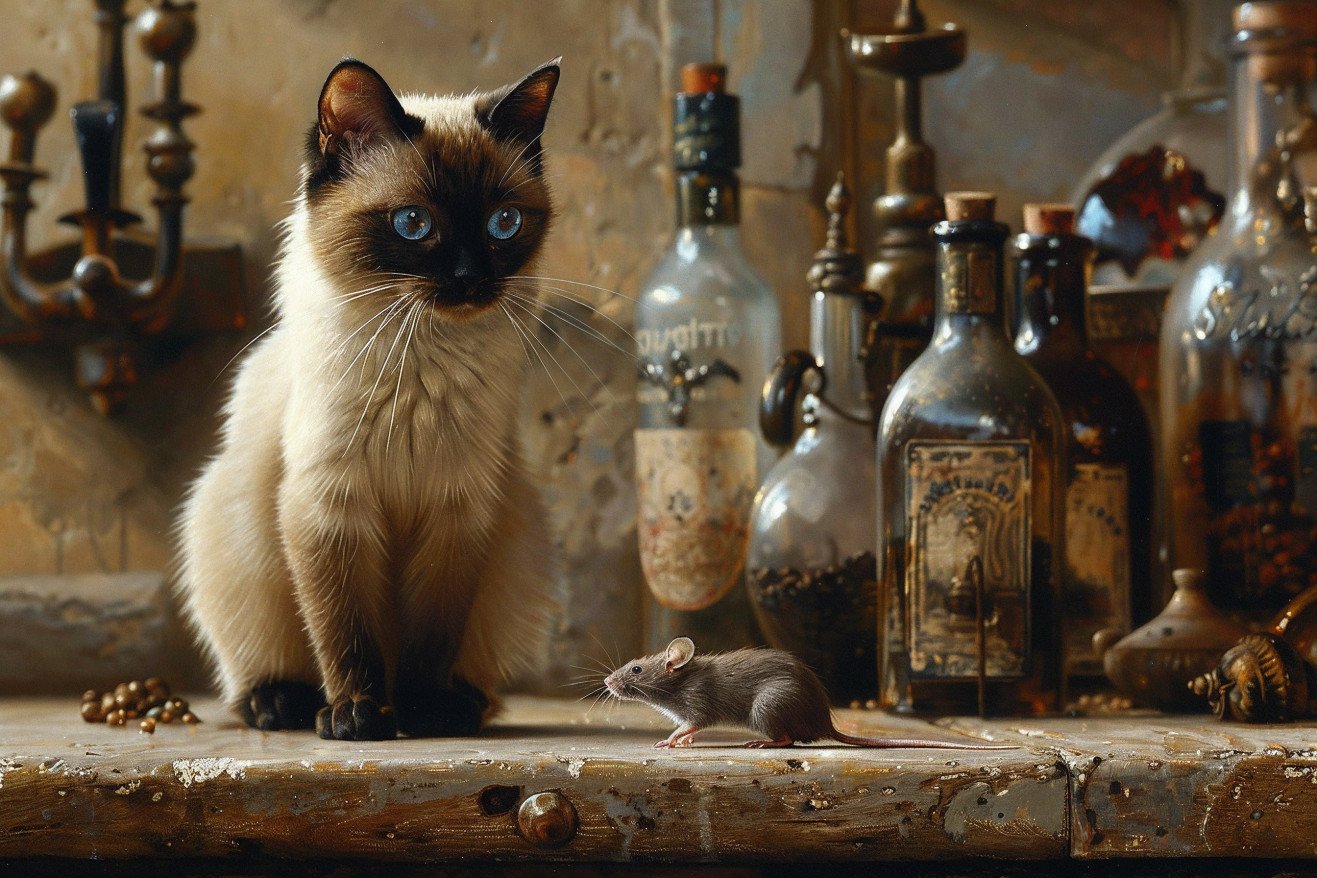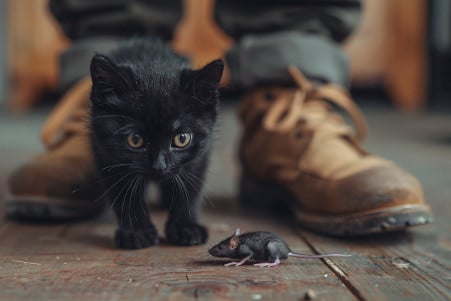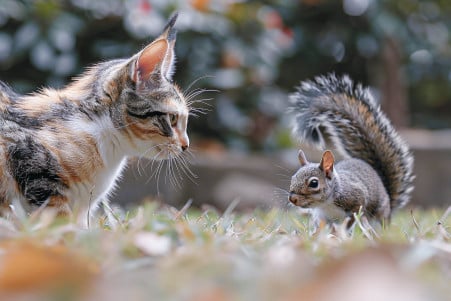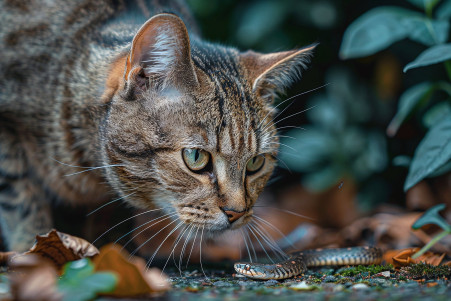Why Do Cats Eat Mice? A Look at Predatory Behavior
20 March 2024 • Updated 20 March 2024

Whether it's due to instinct or just a hankering for a high-protein meal, the question of whether or not domestic cats hunt and eat mice has been a point of contention for pet parents and animal researchers for years. As obligate carnivores, cats' natural diets are made up of animal-based proteins that they have to hunt for, and this instinct often leads to the hunting and consumption of mice or other small animals.
While the thought of a cat snacking on a small, furry rodent may be off-putting to some, we'll explore the science behind this behavior to get a better idea of what's going on.
By looking at feline biology, research on cats' behavior, and personal stories, we'll work to untangle the complex relationship between these two animals and find out what influences a cat's eating habits.
Do cats eat mice?
Evolutionary Origins of Cats' Hunting Instincts
Cats' hunting instincts are a product of their evolution as skilled predators, which can be traced back to their wild ancestors. In fact, PetCareRx points out that ancient Egyptian cats were prized for their ability to hunt and kill mice that were eating away at grain supplies, which shows just how long cats have been known for their hunting prowess.
In addition to helping cats secure food, hunting also has other important functions for cats. According to FOUR PAWS, hunting is a source of mental and physical stimulation for cats. It allows them to fulfill their predatory instincts and get the exercise they need. Even cats that are well-fed by their owners continue to hunt, which shows just how deeply this instinct is embedded in their biology.
Kittens learn how to hunt from their mothers, who bring back live prey for them to practice on. This ensures that the hunting instinct is passed down from one generation to the next. Untamed explains that even though domesticated cats are fed by humans, the hunting instinct has been passed down through their genes for thousands of years.
Mice and other small rodents are the perfect prey for cats because they're small, easy to catch, and can't fly away. The excitement of the chase and the satisfaction of the kill are part of cats' natural instincts, and this is true whether they're wild or domesticated. Recognizing that cats' hunting instincts are a product of evolution helps us understand why it's so important to make sure cats have opportunities to express these instincts in appropriate ways.
The Hunting Sequence: How Cats Hunt and Eat Mice
Cats use a combination of hunting strategies to catch their prey, including ambush, stalking, and pouncing. According to PETLIBRO, cats are natural hunters that rely on their sharp claws, good vision, and strong sense of smell to locate and capture small animals like mice.
Once a cat has caught a mouse, it will often "play" with the mouse by batting, tossing, and pushing it around. Vetstreet speculates that this may be a way for the cat to exhaust and disorient its prey. If a cat decides to eat the mouse, it will often begin by eating the head first. According to Untamed, cats seem to consider the head a "delicacy."
It's important to note that cats don't always eat the mice they catch. According to Untamed, cats may bring their prey to their owners as a gift or because they think their owners are bad hunters. The entire hunting sequence, from finding the prey to eating it, can take a cat several hours to complete.
The Dangers of Cats Eating Mice
While there are some benefits to cats eating mice, the potential dangers are much more concerning. PROVET HEALTHCARE INFORMATION explains that mice and other rodents can carry a number of diseases that can be passed on to cats, including tapeworms and leptospirosis. The Spruce Pets adds that cats can also become infected with serious diseases like toxoplasmosis, plague, hantavirus, and tularemia from eating rodents.
Cats may not exhibit symptoms right away after eating a mouse, but Catster notes that it’s important to seek veterinary care immediately if symptoms like lethargy, gastrointestinal problems, or organ failure occur. In addition, The National Institutes of Health warns that toxoplasmosis can be particularly dangerous for pregnant women and people with compromised immune systems.
There are ways to minimize the dangers of cats eating mice, such as keeping cats indoors and avoiding the use of rodenticides. However, it’s important for cat owners to be aware of the potential risks so they can take steps to protect their cats and their loved ones.
How to Stop Cats from Hunting Mice: Tips for Pet Owners
The most effective way to stop cats from hunting mice and other small animals is to keep them indoors, according to Cat Bringing 'Gifts'? Tricks to Save Mice or Birds Your Cat Brings You. For cats that go outside, putting a bell on their collar can help animals hear them coming and escape, as noted by Vetstreet.
Pet owners can also help cats satisfy their hunting instincts in a safe way by playing with them and using interactive toys, according to Purina. In addition, pet owners can reduce the likelihood of cats hunting by removing potential prey from their environment, such as bird feeders or areas where mice may be found, as suggested by Purina.
Finally, if a cat does bring a live or dead mouse home, it's important to know how to handle the situation and dispose of the mouse to avoid potential health risks, according to Cat Bringing 'Gifts'? Tricks to Save Mice or Birds Your Cat Brings You. By taking these steps, pet owners can help their cats satisfy their natural instincts while also keeping them safe.
Final Thoughts: Understanding the Instincts Behind Cats' Mouse Consumption
Although the idea of cats hunting and eating mice may be disturbing to some people, this behavior is a normal part of their evolutionary and biological heritage. Cats' hunting instincts help them meet a range of needs, including securing food, exercise, and fulfilling their predatory drive.
At the same time, it's important for pet owners to understand the dangers that may be associated with cats eating mice, including the potential for exposure to diseases, parasites, and poisons.
By taking steps to prevent their cats from hunting and offering them other ways to express their hunting instincts, pet owners can ensure that they're honoring their cats' natural behaviors while keeping them safe.
In the end, respecting and understanding feline nature is an essential part of being a responsible and knowledgeable pet owner.


